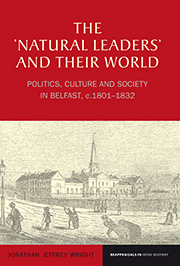Book contents
- Frontmatter
- Contents
- Acknowledgements
- Abbreviations
- Introduction
- 1 Will Tennent's band of ‘bastards and rebels’: the Tennent family in its contexts
- 2 The ‘natural leaders’, part one: politics and personalities in Belfast, c.1801–1820
- 3 The ‘natural leaders’, part two: Belfast, Europe and the age of reform
- 4 ‘The manhood of the mind’: classicism, romanticism and the politics of culture
- 5 ‘Thank-offerings to the God of providence’: philanthropy, evangelicalism and social change
- Conclusion
- Appendices
- Select Bibliography
- Index
3 - The ‘natural leaders’, part two: Belfast, Europe and the age of reform
- Frontmatter
- Contents
- Acknowledgements
- Abbreviations
- Introduction
- 1 Will Tennent's band of ‘bastards and rebels’: the Tennent family in its contexts
- 2 The ‘natural leaders’, part one: politics and personalities in Belfast, c.1801–1820
- 3 The ‘natural leaders’, part two: Belfast, Europe and the age of reform
- 4 ‘The manhood of the mind’: classicism, romanticism and the politics of culture
- 5 ‘Thank-offerings to the God of providence’: philanthropy, evangelicalism and social change
- Conclusion
- Appendices
- Select Bibliography
- Index
Summary
As chapter two has demonstrated, the natural leaders' political outlook was a broad one. They not only sought to engage with British political issues, but adopted tactics similar to those employed by British radicals and reformers, using short-term scandals to make broader political points. However, moving beyond the Irish and British contexts, the breadth and complexity of the natural leaders' engagement with politics may be further illustrated by widening the focus and examining their attitudes towards contemporary European events. Belfast's reformers had followed European political developments closely during the 1790s and they retained an interest in European politics in the early years of the nineteenth century. In its first four issues alone, the BMM reported on events in Austria, France, Holland, Italy, North America, Poland, Portugal, Russia, Spain, Sweden and Turkey. But what form did this interest take? Before picking up where chapter two left off and examining the natural leaders' attempts to advocate the cause of reform during the 1820s, this chapter will examine the Belfast reformers' engagement with European events, focusing, in particular, on the sequence of revolutions that spread through southern Europe during the late 1810s and early 1820s and on the July Revolution of 1830. At a time when developments in Ireland – not least the hardening of sectarian divisions – rendered their position increasingly difficult, these were events that offered Belfast's reformers an important source of encouragement and inspiration. We may begin, however, by examining the Belfast reformers' response not to an event, but to a person, arguably the person of the age, Napoleon Bonaparte.
- Type
- Chapter
- Information
- The 'Natural Leaders' and their WorldPolitics, Culture and Society in Belfast, c. 1801–1832, pp. 106 - 137Publisher: Liverpool University PressPrint publication year: 2013



